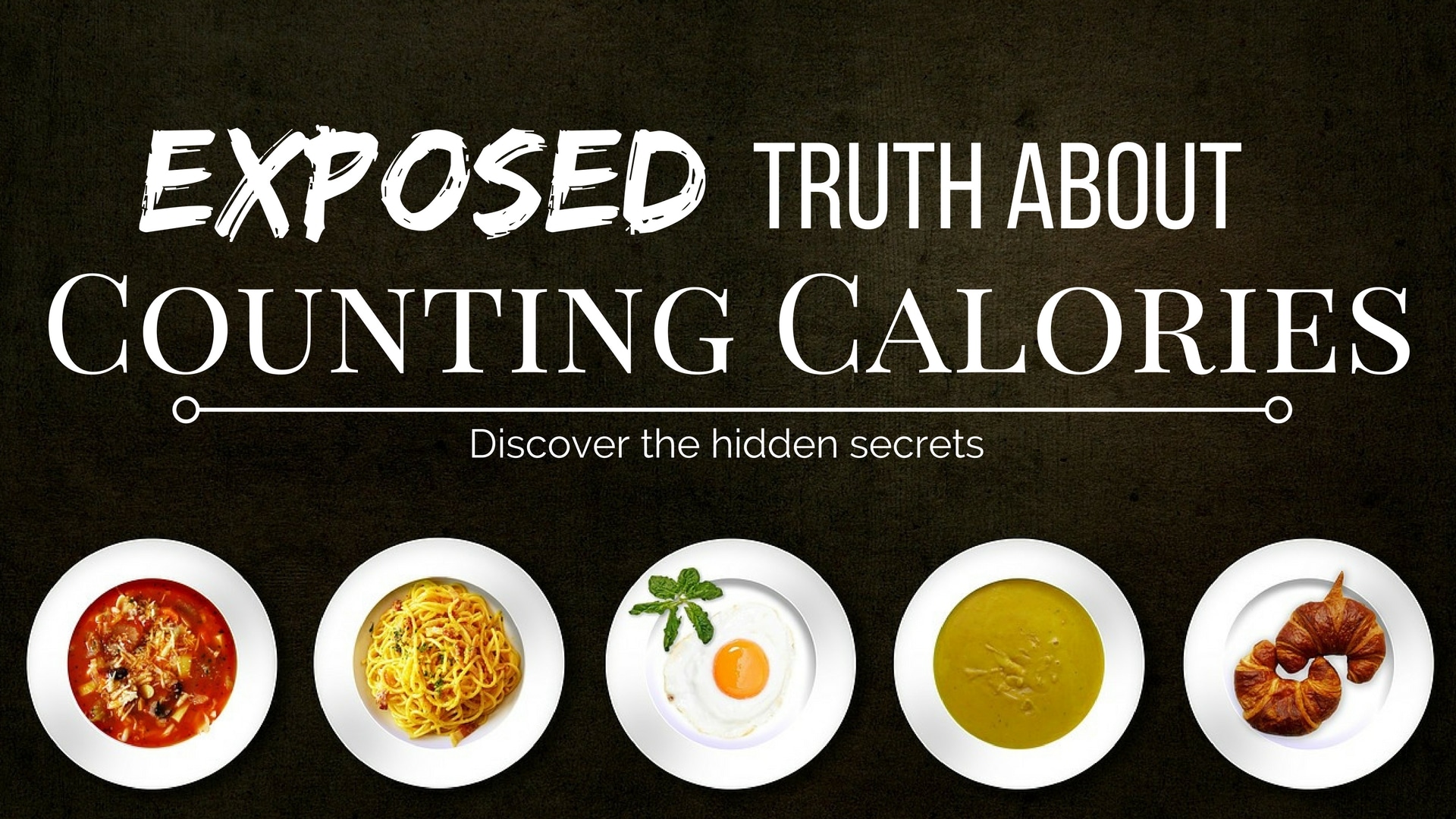Counting Calories – Is it Worth the Hassle?
Counting Calories - Is it Worth the Hassle?

How many breaths did you take today?
How many times did your eyes blink?
How many calories did you consume today?
Can you give me a precise answer to all three questions? The good news is that you really don't need to. Yes, that includes calorie counting - it just isn't necessary.
Sure, it's important to keep an eye on what you eat. Every now and then it makes sense to glance at the nutrition label and get an idea of how many calories, % of nutrients, etc. are provided by the product.
Also, don't get me wrong the principles of energy balance are true - consume more calories than you need and you will gain weight; consume less calories than you need, and you will lose weight. The problem, though, is that calorie counters often forget to look at the entire picture.
All too often, calorie counting dieters find themselves consuming large portions of manufactured, processed, inflammatory foods simply because the packaging says its lower in calories. For example, I find some clients reaching for the low-calorie package of cookies instead of a piece of fruit (say, a banana or apple) because of its lower calorie content. True, sugar-free, fat-free, or artificially sweetened products may be "lower in calories."
We need to look at the whole picture, though. Lower calorie foods are not always healthier foods.
Even Weight Watchers decided to reconfigure their PointsPlus program. They were popular for their calorie counting program. Recently, they decided to shift from the simplistic calorie counting approach to emphasizing smart food choices that contribute to both weight loss and healthier eating. Weight Watchers' new system considers how a food's main nutrients work to contribute to weight loss. For example, some foods are scored higher than others for causing a fuller, more satisfied feeling. Their system no longer treats all calories equally - neither should we.
It's not all about the calories. What other information should we gather about food before making a food choice besides calories?
-> What about the micronutrients (vitamins, minerals), antioxidants, and those disease-fighting plant chemicals known as phytonutrients?
Going back to those low-cal cookies versus that apple, what can we say about these categories? Those cookies may be 100 calories per package. They're lacking in naturally occurring antioxidants, though. Your humble apple, on the other hand, has a phenomenal arsenal of phytonutrients and antioxidants, including myricetin, kaempferol, epicatechin, and vitamin C. Some apple polyphenols can help stabilize your blood sugar. One special apple polyphenol - quercetin - can slow down carb digestion by inhibiting certain enzymes from breaking down complex carbohydrates into simple sugars. It can also block absorption of some glucose from the GI tract. This all translates into less sugars flowing in your blood stream. High intakes of quercetin are also associated with lower risk of asthma, lower risk of death from heart disease, and lower lung cancer cases. 1-3
-> Another useful piece of information aside from calorie content is fiber content! And even if there is fiber in the food, where does it come from? Is it naturally occurring? Many processed foods have added fibers thrown in (such as inulin) instead of naturally occurring fibers found in whole foods.
As opposed to low-cal cookies, apples are a fiber+phytonutrient combo. Not only do you get a spectacularly strong source of antioxidants, but you also get natural insoluble and soluble fiber, including a water-soluble fiber known as pectin. When apples are eaten whole (skin and flesh), the soluble fiber in apples interacts with the apple's phytonutrients to lower blood fats - including LDL cholesterol and triglycerides. This is key to lowering risk of many heart problems. 4
-> What about added sugars? How many of those sugars are from refined sugars that provide empty calories, spike insulin, and promote fat storage? How many are naturally occurring, such as in fruit or dairy products?
Sure, the apple will have sugars (about 18 grams per medium apple to be exact), but these sugars come with the full bundle of micronutrients, antioxidants, and fiber. They aren't refined, and they won't program your body to store fat.
-> What else can we ask ourselves aside from how many calories are in the food? Well, how is the food grown? Are the ingredients organic? Are they in their whole form or is the product enriched with nutrients (such as vitamin D-fortified milk or vitamin-fortified bread). Ask yourself how are these ingredients processed? Are they made in a lab (if you can't pronounce them or don't recognize them, they probably were) or are they grown from soil?
Calorie Counting - A Misguided Theory
Calorie counting simply focuses on quantity. As we've seen so far, this theory fails to include the principle of quality! For example, does the product have healthy fats, such as unsaturated fatty acids or anti-inflammatory omega-3 fats? Or is it a processed food which has trans fats that can be harmful to health and that should be absolutely avoided?
The point is, it's not only about the calories, and not all calories are the same. If it were, diet soda would be equal to water. Both have the same amount of calories, after all. What's wrong with that statement, though? Water isn't full of artificial sweeteners with unknown long-term side effects.
If it were all about the calories, a couple sugary sodas a day would be okay as long as you don't exceed your calorie limit or as long as you exercise until you burn off those calories. Your body cannot be fooled, though. It recognizes the difference between 200 calories of soda and 200 calories of a nutrient-rich guacamole.
It may seem revolutionary, rebellious, or shocking, if you will, to read that calories don't count that much. It comes as no surprise since this theory has been promoted for decades and is the foundation of so many diet plans and programs, weight loss apps, and calorie trackers.
The truth is: diets based on calorie counting can set you up for yoyo-ing between weight loss and weight gain, nutritional deficiencies, stress, lethargy, and energy deprivation. A diet low in calories but rich in poor-quality foods (such as processed foods, refined carbs, and added sugars) causes an imbalance in hormones involved in metabolism. This encourages fat storage and, even worse, encourages the body to hold on tight to that fat.
Do you want to lose weight for good? Calorie counting isn't necessary.
Do you want to lose weight and improve your health? Calorie counting isn't necessary.
Do you want to lose weight, improve your health, keep your immune system strong, and improve your metabolism? Calorie counting isn't necessary.
Your goal may not be weight loss at all. It may just be to improve your health markers. You want to live longer. And, no, you don't want to just survive to see your grandkids. You want to be the energetic grandparent that can keep up with the grandkids. You want to radiate with the rest of the family in family photos of all your children and grandchildren's milestones. The graduations. The weddings. The births. As a plus, you'll be setting a great example for the rest of your loved ones.
Let's face it! It's also cheaper to be healthy. A Credit Suisse report on sugar highlighted an alarming detail about sugar and the U.S. healthcare system-- 30-40% of healthcare expenditures in the USA are used to address issues closely related to excessive sugar consumption. 5
A healthier lifestyle keeps medical costs down, not to mention you spend less precious time in doctor waiting rooms.
References:
- Nutr J. 2004 May 12;3(1):5. 2004.
- European Journal of Clinical Nutrition (2003) 57, 904-908. 2003.
- Int J Mol Sci. 2010; 11(4): 1365-1402. 2010.
- Lipids Health Dis. 2009; 8: 39. 2009.
- https://doc.research-and-analytics.csfb.com/docView?language=ENG&source=ulg&format=PDF&document_id=1022457401&serialid=atRE31ByPkIjEXa/p3AyptOvIGdxTK833tLZ1E7AwlQ=
OFFICE HOURS
Monday
9:00am - 11:00am
3:00pm - 6:00pm
Tuesday
5:30pm - 6:30pm
Wednesday
9:00am - 11:00am
3:00pm - 6:00pm
Thursday
9:00am - 11:00am
Friday
Closed
Saturday
Closed
Vilulu
2051 Reed Road Suite B
Fort Wayne, IN 46815
(855) 784-5858


